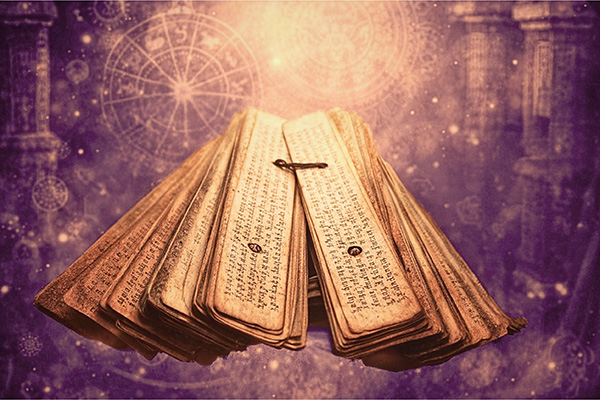texts and scriptures
My Magical Experience With Indian Palm Leaf Reading
 A few years ago, I had amazing experience with Indian palm leaf reading.
A few years ago, I had amazing experience with Indian palm leaf reading.
As a professional psychic and lifelong spiritual adventurer, I’m always eager to explore lesser-known forms of divination and ancient spiritual practices. Over the years, I’ve had the incredible opportunity to dive into a wide range of mystical traditions, some well-known, others more obscure. Each one has offered a unique and enlightening glimpse into the mystical and unseen.
It was that same sense of wonder and incurable curiosity that led me to explore the mysterious tradition of the Nadi Leaves. I’m so glad I did!
The Nadi Leaves, also known as Nadi Astrology or Palm Leaf Astrology, are ancient texts found primarily in South India, specifically in the state of Tamil Nadu. They are believed to contain the pre-written life stories and destinies of millions of individuals, inscribed thousands of years ago.
According to tradition, these prophetic records were created by the Saptarishis (Seven Sages) like Agastya, Bhrigu, and Vashistha, who used their yogic powers to foresee the past, present, and future of humanity. The Sages are said to have recorded these destinies out of compassion for future generations.
Originally, the Nadi Leaves were archived in Hindu temple libraries, especially in South India. These sacred texts were carefully preserved by temple priests, who regarded them as divine revelations. As the centuries passed and the original leaves began to decay, they were carefully recopied onto fresh palm leaves to ensure their survival.
A Mystic’s Guide To The Final Months Of 2025
 As we move into the final months of 2025, the energy around us feels less like things are quietly wrapping up and more like they are building toward a big, undeniable turning point.
As we move into the final months of 2025, the energy around us feels less like things are quietly wrapping up and more like they are building toward a big, undeniable turning point.
This is not just the year slowly running out of days. It is a season where the universe seems to be leaning in close, asking us to pay attention. There is a sense that something important is in motion, even if we cannot see all the pieces yet.
These last months carry a certain electricity in the air, a quiet pressure that says, “Something is shifting. Are you ready?” But it’s not about pushing harder or doing more. It is about listening more deeply, trusting more fully, and allowing the old ways to loosen their grip so we can step into what is next.
We are in a threshold season: that sacred in-between space where the old patterns no longer fit, but the new has not fully taken form. It can feel strange, even uncomfortable, like standing in a doorway, grasping one handle while peeking into another room, not quite ready to let go, yet knowing you cannot stay where you are.
You might notice a pull to slow down, choose your time and energy more wisely, or step back from noise and distraction. This is not you being unproductive; it is your inner compass reorienting. Your soul knows when it is time to listen within. Sometimes it whispers through restlessness, sometimes through a craving for solitude, sometimes through sudden clarity about what no longer feels right.
The Spiritual Implications Of The Lazarus Syndrome
 Recently, while watching the 2008 film The Lazarus Project, I was reminded of the paranormal phenomenon of near-death experiences (NDEs) and became intrigued by the possibility of someone coming back to life after death.
Recently, while watching the 2008 film The Lazarus Project, I was reminded of the paranormal phenomenon of near-death experiences (NDEs) and became intrigued by the possibility of someone coming back to life after death.
The plot of the movie is about a man who is given a second chance at life after being executed for a crime. Despite being lethally injected, he somehow wakes up in a psychiatric hospital and must overcome a series of mysterious and mystical challenges to be reunited with his family.
The title, of course, refers to the story in John 11 of a man named Lazarus who was raised from the dead by Jesus after four days. While the plot of the movie does not directly parallel the biblical story, it does draw on the themes of resurrection and second chances.
My newfound curiosity soon led me to discover a documented medical phenomenon known as “Lazarus Syndrome.” Also known as the “Lazarus phenomenon” or “autoresuscitation,” it is a rare medical condition in which a person spontaneously comes back to life after all attempts at resuscitation have failed and the person has been pronounced dead.
The phenomenon was first noted in medical literature in 1982 by Finnish anesthesiologist Dr. Kalevi Linko, who described it as the spontaneous return of circulation after resuscitation efforts have ceased. The term “Lazarus phenomenon” was later popularized by Dr. John Francis Bray in 1993, who used the biblical reference to describe these rare cases of patients who spontaneously return to life.
12 Universal Spiritual Laws You Need To Know
 Most spiritual seekers today are familiar with the universal Law of Attraction. But did you know that there are several other universal spiritual laws that govern our existence?
Most spiritual seekers today are familiar with the universal Law of Attraction. But did you know that there are several other universal spiritual laws that govern our existence?
The origins of our understanding of the universal spiritual laws are deeply rooted in various religious and philosophical traditions, as well as in the collective wisdom of human experience since the dawn of time.
Many of these spiritual laws are rooted in ancient wisdom traditions from around the world. These traditions evolved over thousands of years as sages, scholars, and spiritual leaders refined and elaborated upon the fundamental principles that govern all existence.
Mystical traditions within various religions have also played an important role in the development and interpretation of these spiritual laws. Mystics tend to explore the deeper, esoteric aspects of their faith, seeking direct experience of divine truths. Their insights and revelations have contributed to a deeper understanding of spiritual principles beyond literal interpretations of religious texts.
Philosophical traditions in ancient Greece, China, and other civilizations also contributed to the development of spiritual principles that later evolved into universal laws. Thinkers such as Plato, Aristotle, Confucius, and Laozi explored concepts related to ethics, metaphysics, and the nature of reality that influenced later spiritual teachings.